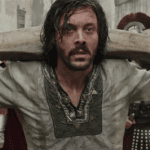It’s been four years since the last Fantastic Beasts movie, and six years since the first one, and truth be told, I barely remember them. Maybe it’s because prequels are generally not as good as the original films, or maybe it’s because these movies are being written directly for the screen and are not based on novels that generated their own hype at the bookstore, but for whatever reason, the Fantastic Beasts series — which was supposed to flesh out the back-story to the Harry Potter franchise and give it a more international scope — simply hasn’t stuck in the mind like the original movies did.
The new film is unlikely to change that, despite the fact that it foregrounds one of the most beloved characters from the Harry Potter books. The main thing I took away from it was that everyone involved in making it seems to be ready for the franchise to end. Fantastic Beasts was originally going to be a five-movie series, with a new movie coming out every two years, but after the second movie underperformed at the box office in 2018, the third film was sent back for rewrites (so the script is now credited to J.K. Rowling and Steve Kloves, “based on a scrtaeenplay by J.K. Rowling”, which is a departure from the usual “story by” / “screenplay by” distinction), and then the production ran into Covid delays, and somewhere along the way Johnny Depp (who played Albus Dumbledore’s lover/nemesis Grindelwald in the first two movies) became a hot potato so they replaced him with Mads Mikkelsen, and the production has had to deal with the constant bad news around co-star Ezra Miller (who plays the troubled, mysterious Credence Barebone), and it has had to deal with the controversies surrounding Rowling herself…
And with all that swirling around behind the scenes, the movie itself ties up a surprising number of narrative arcs, in such a way that, if the franchise simply stopped here, it wouldn’t be the worst thing in the world. Because this is a prequel series, we all know where the fifth movie would have to go — we know what ultimately happens to Grindelwald, because the very first Harry Potter book told us 25 years ago — but if this particular part of his story came to an end here and we never got the next part… well, it’s not like we needed a prequel series in the first place, right?
To put this another way: I didn’t get the feeling that the new film was trying to leave us wanting more, and indeed, I got the feeling that the people involved in making it weren’t sure that we would want more. So, if this movie does really well at the box office, then great: they can greenlight another movie or two to fill the gap between these first three movies and the ending that we all know is coming. But, if the movie doesn’t do well at the box office, then oh well, at least some of the major plot threads that were introduced in the first two movies have been more-or-less resolved and we can end it there.
Or so it seems to me.
And — partly to avoid spoilers, and partly because the actual story just isn’t all that engaging — I haven’t even gotten into the details of what the plot is actually about this time. But suffice it to say that, while “rigging an election” might not quite be up there with “the taxation of trade routes” as a mind-numbing premise for a prequel to a former children’s adventure series, it’s arguably getting there… and the movie kind of has to go out of its way just to shoehorn a magic creature or two into the story as plot devices, just so it can justify using the words “Fantastic Beasts” in the title…
All that being said, some of the casting decisions do work here. Mikkelsen, who famously played the homoerotically seductive Hannibal Lecter in NBC’s Hannibal series, is far more convincing as a possible ex-lover of Jude Law’s Albus Dumbledore than Depp ever was. And I got a kick out of the fact that Dumbledore’s brother Aberforth — who has a secret or two of his own, and was played by Ciarán Hinds in the last Harry Potter movie — is played here by Richard Coyle, who played Caiaphas in A.D. The Bible Continues.














